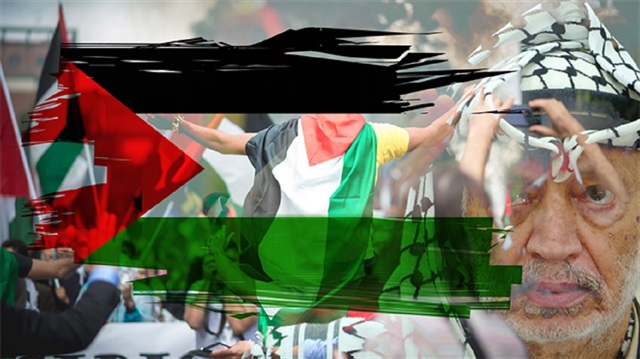
Twenty eight years ago, on November 15, 1988, the Palestinian National Council in Algeria declared the independence of the State of Palestine, which claims the territories of the West Bank and the Gaza Strip, with Jerusalem as a designated capital.
The proclamation came a year after the start of the first intifada, which was triggered following the death of four Palestinians purging by an Israeli military vehicle on Nov. 9 1987.
The popular resistance began in a piecemeal fashion with demonstrations and civil disobedience at the Jabalia refugee camp in Gaza, then spread and extended all around Gaza, the West Bank and East Quds.
Israeli occupying authority had used heavy military forces to stop the Palestinian popular resistance. Seven percent of Palestinians, aged under 18, were wounded either by weapons or tear gas.
In the first 13 months, 332 Palestinians and 12 Israelis were killed. Given the high proportion of children, youths and civilians killed, it then adopted a policy of 'might, power, and beatings,' namely "breaking Palestinians' bones".
A total of 1,300 Palestinians were killed during the first Intifada period. More than 120,000 Palestinians had been detained as most of them faced Israeli brutality in prisons.
Palestinians from all ages showed solidarity with Intifada, a Palestinian uprising against the Israeli occupation that forced the Israeli authority to accept Palestinians as an official party to discuss the issue.
Since then, the Palestinian people had run a long-standing campaign for their basic rights.
The large number of Palestinian casualties provoked international condemnation. In subsequent resolutions, including 607 and 608, the Security Council demanded that Israel cease deportations of Palestinians. In November 1988, Israel was condemned by a large majority of the UN General Assembly for its actions against the intifada. The resolution was repeated in the following years.
On October 14, 1990, Israel openly declared that it would not abide by the Security Council Resolution 672 and refused to receive a delegation of the Secretary-General, which would investigate Israeli violence. The following Resolution 673 made little impression and Israel kept on obstructing UN investigations.
The first Intifada lasted until the Madrid Conference in 1991.
Around 100 states across the world, including Turkey, China, Russia, and India, had recognized Palestinian Statehood.
The European Union and most of EU member-states have not officially recognized Palestine's sovereignty.
The Palestinian Authority (PA), formerly known as the Palestinian National Authority (PNA), was formed as a consequence of the Oslo Accords between the Palestine Liberation Organization (PLO) and the government of Israel.
The Oslo Accords included the "Declaration of Principles on Interim Self-Government Arrangements" (Oslo I Accord), signed in 1993, the Gaza-Jericho Agreement (Cairo Agreement), signed in 1994, and the Interim Agreement on the West Bank and the Gaza Strip (Oslo II Accord), singed in 1995.
The PA divides its territories into governorates (11 in West Bank and 5 in Gaza). Governors are appointed by the PA head and are in charge of predominantly administrative issues, resolved in coordination with PA municipal and mayoral authorities. The president of the PA, who is also the commander-in-chief of the armed forces, is directly elected by the people. Yasser Arafat was the first president of the PA.
The current president, Mahmoud Abbas, was elected in January 2005. The legislative branch of the PA is the Palestinian Legislative Council (PLC). 74 of the 132 PLC seats were won by representatives of the Hamas Islamic organization in the January 25, 2006 parliamentary elections.
The PLO-affiliated Fatah party was thus defeated. PLC's activity is now paralyzed since a significant number of its members, mostly Hamas supporters, have been arrested and imprisoned by Israel on political grounds.
In March 2007, a national unity government headed by PA Prime Minister Ismail Haniyeh of Hamas was briefly formed, but tensions between Fatah and Hamas over control of Palestinian security forces soon erupted leading to the 2007 Battle of Gaza after which Hamas took control of Gaza, while its officials were ousted from government positions in the West Bank.
In 2011, Hamas and Fatah announced a reconciliation agreement that provides for the creation of a joint caretaker Palestinian government.
Progress stalled, until a new Palestinian unity government was sworn in on June 2, 2014.
On November 29, 2013 the UN General Assembly raised the status of the PA in the organization to "observer state" and reaffirmed the right of Palestinians to self-determination within the territories occupied by Israel in 1967.
On January 5, 2014, Abbas signed a decree renaming the PS into the State of Palestine.
Over 100 countries have recognized Palestine as a sovereign state. The European Union and most of the EU member states have not officially recognized Palestine's sovereignty.






















